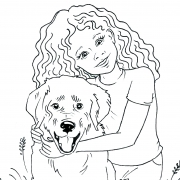How To Help Kids Cope With The Death Of A Pet
Help kids cope
I’m Maddie’s mom and stepping in to discuss a sensitive topic but one that is very important. This article is for parents and will offer resources and tips on how to help kids cope with the loss of a pet. 1 in 5 kids will experience the death of someone close to them by age 18 and, for many children, their first real experience with this kind of loss occurs when a pet dies.
Children view pets as valued and treasured members of the family and as confidantes and best friends resulting in very real pain when the pet dies. As parents, it is natural to want to protect our kids from grief, but coping with the painful reality of death is a very important life lesson. Learning how to navigate the grieving process will help kids cope with other important losses throughout their life.
How and When to Tell Kids the Pet has Died
• Be Truthful: According to the American Academy of Child and Adolescent Psychiatry, it is best to be honest when telling the child that a pet has died. Trying to protect children with vague or inaccurate explanations can create anxiety, confusion and mistrust. www.aacap.org
• Be Age-Appropriate: Gauge how much information to share based on the child’s age and maturity level, and be careful not to tell your child more than they want to know. They will have questions, so these can guide the discussion. Answer simply but honestly using words and concepts they’ll understand. Explanations based on the family’s personal belief system or religion may be very helpful. According to the AACAP, children ages 3-5 see death as temporary or potentially reversible. They may need to be reminded that the pet will not wake up, and it might take them some time to truly accept that their pet is not coming back. Between 6 and 8, they begin to develop a more realistic understanding of the nature and consequences of death. Generally, by age 9, children can understand that death is final and permanent.
• Share the information with them privately in a comfortable, familiar place, and offer comfort with a soothing voice or holding their hand or putting an arm around them.
• If the pet has a long-term illness or is very old, consider talking to your child before the death of the pet to help them prepare mentally and emotionally. When the pet is sick or dying, talk to kids about their feelings and, if possible, let them say goodbye.
• What about euthanasia? This can be a sensitive subject, and how much information you share will depend on the child’s age and maturity level. Experts agree that words like “put to sleep” should be avoided as this can be misleading, and the child may assume the pet will wake up again. It might be helpful to tell a young child that “Fido’s body just won’t work anymore because it is so old.”
Dealing with Grief
• Children need to know that grief is normal and that it is totally okay for them to feel very sad and to cry. Allow your child to see you grieve. Let them see that expressing your sadness and talking about it is a healthy thing to do. It is comforting to know that we’re not alone in our grief.
• There are no right and wrong ways to deal with grief. Many emotions may be felt including anger, frustration, sadness, guilt and even regret. Different emotions may be felt on different days as we all navigate through grief, and it is important to teach our kids that it is okay to feel those feelings.
• Give kids time to not only remember their pet but to mourn in their own way. They may want to have a ceremony, draw a picture of their pet, write a poem or a story or pray.
• It may be helpful to tell the child that their pain will eventually go away but that they’ll be able to cherish their memories forever. Putting together a scrapbook of happy memories can be a great family project. Kids might enjoy memorializing the pet by planting a tree in his/her memory.
• The American Academy of Child and Adolescent Psychiatry reminds us that short-term responses to grief are normal in children. They may have mood swings or temper tantrums or even act like the pet is their imaginary friend. Be on the look-out, however, for signs the child might need more support to navigate their grief. These signs may include withdrawing from friends or disinterest in school, loss of appetite or interest in daily activities, unexpected anger or crying weeks after the pet’s death. If you see these signs or other concerning signs, please talk to a professional counselor.









